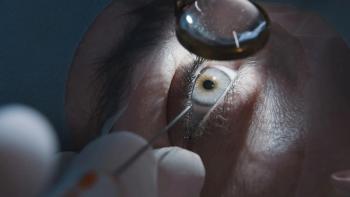
The negative effects of digital media on pediatric development
Healthy digital media habits make a healthy child.
Optometry Times® editor Kassi Jackson speaks with Valerie Kattouf, OD, FAAO, chief of Lewenson Pediatric and Binocular Vision Service and associate professor at the Illinois College of Optometry, on the effects of digital media on the pediatric population.
This transcript has been lightly edited for clarity:
Kassi Jackson, editor:
Hi everyone, I'm Kassi Jackson with Optometry Times, and I'm joined today by Dr. Valerie Kattouf, chief of Lewenson Pediatric and Binocular Vision Service and associate professor at the Illinois College of Optometry. Thank you for being here. Dr. Kattouf.
Valerie M. Kattouf, OD, FAAO:
Thanks for having me; pleasure to be here.
Jackson:
So let's talk about children's eye health. According to data provided by the World Health Organization, vision impairment and blindness affect 2.2 billion people worldwide, and 90 million of those affected are children. So why is children's eye health so important?
Kattouf:
Well, I think one of the things to consider is that, you know, vision is a primary input. It's an input method that influences a child's learning, their development, their demeanor, their stamina; it has an effect on everything.
And I think sometimes the misconception is that vision is just about clarity. Clarity is just one part of vision; we need the visual system to be functional, we need it to be flexible, and we need it to be efficient. And there's so many parts that go into that.
Jackson:
Digital media can affect pediatric development. How do you define digital media?
Kattouf:
So digital media is pervasive. And in today's world, it's everywhere. So digital media are your phones, it's your tablets, its computers, its TVs, it's the DVD player in the car. It's all of those things. And I really think if—especially parents—were to look at it and add up the hours, it's much more exposure for your child than you even think.
Jackson:
What type of effect does digital media have on children's visual system specifically, looking at focusing on accommodation?
Kattouf:
When I talked about visual function, we have the focusing system which has to function readily, we have the eye teaming—or binocular vision system—that has to function.
What parents have to realize is, it's really the phones and the tablets and the computers and the hours spent here that we have these near demands, we are up close on things. And to be honest, our bodies weren't meant to do that; our visual system wasn't meant to do that.
We all have a certain amount of focusing power—kids have a lot more than adults— it's why when adults reach into their 40s, they need reading glasses, because we lose focusing power over time. So kids ideally have an immensely strong focusing system that should be flexible and efficient. But my goodness, we are just seeing a decrease in that today.
So literally, the focusing system is a muscle and it gets worn down from too much near demand. If you were to walk around with a 10 pound weight in your arm all day long with your bicep curled, your bicep will be tired. It's the same thing. Kids are on these devices excessively, and it wears down their focusing system.
Jackson:
And how is children's biocular vision impacted by digital media?
Kattouf:
Binocular vision is your eye teaming skills; it's how well your eyes work together. So yet another system that has to be efficient and flexible, it gets worn down.
But I think one of the main things to realize is that binocular vision development, it starts in the brain. And there are a lot of neurological concerns that screen-based activities stimulates visual processing a lot more than it does sensory processing.
So all of that development is affected number 1 by how young we started our kids with an extensive use of devices, and then the excessive use of those devices as well.
Whether it's focusing or it's eye teaming, they both get worn down.
Jackson:
And what about ocular motor dysfunction?
Kattouf:
Ocular motor dysfunction is tracking. So that's an issue with tracking, you know, kids who have difficulty reading, focusing with attention, they can have ocular motor or tracking problems.
A lot of screentime doesn't always facilitate great fine motor development, and ocular motor skills or a fine motor skill.
Jackson:
In your expert opinion, in what way does digital media attribute to the development of pediatric myopia?
Kattouf:
So myopia is nearsightedness.
Basically, someone who—without their glasses—has a difficult time seeing far away; their near vision is usually better, their distance vision is usually more affected. So that's what myopia is.
And myopia is known to progress over time. If you know someone who's nearsighted, their prescription might be -2 the first time ... the next year 3... and it just keeps going up. And that can become pathological over time.
Number 1, it's visually burdensome; you can get holes, breaks, tears in the back of your eye or in your retina. So myopia is something we want to control; we don't want to see that progression.
When you have excess near demands, you are doing close work all the time—screens, tablets, computers—then you get excess accommodation or focusing, that actually increases the length of the eyeball, the axial length of the physical eye, and that increases myopia.
There are truly modifiable behaviors that affect the development of myopia. The more indoor time, the more time on screens.
It's very often an environmental factor that makes myopia progress over time. It's proven statistically—through studies—that the more time kids spend outdoors—the less near demands they have, often with that, the less myopia develops.
Jackson:
Moving beyond eye functions, what role does digital media play on children's overall development and their self esteem?
Kattouf:
It's been proven that the higher the use, the the greater the early exposure to digital media, it has negative effects on children, it has negative effects on their intellectual development. It has negative effects on their social and emotional development, as well.
I've always said, we've never seen a generation that has had such early exposure to near demands visually. And then what that does for them in all these other areas: the intellect, the social, and the emotional.
There's a lot of different kinds of books and articles and things on these topics, and some have described digital devices as the third party in the parent-child relationship. So it is that highly influential.
And when you develop unhealthy online habits, then you have unhealthy outcomes. And we see that in teens and tweens, the more unhealthy their digital media use is, the more problems we have with anxiety, depression, issues with coping, things like that.
Jackson:
Studies have shown that children with myopia have higher levels of anxiety and depression. Do you think this is connected to the use of digital media?
Kattouf:
That's interesting.
When you go to optometry school, the first year you have everyone in the class raise their hands that are nearsighted, you know, 75% of the class are my myopes and near sighted. Is that because that's how they got exposed to the profession? Or is it because they're great students?
Kids with myopia tend to be type A personalities; they're go-getters, they work hard, they get into things so you have that personality-driven factor.
And then yes, maybe, I mean, we've seen an increase in how rapid myopia is progression over a number of years. And there's no question that the influence of just excessive use of digital devices has influenced it.
It's certainly not the only thing.
Jackson:
Are there steps our audience can take to support and empower children in their overall development?
Kattouf:
I think that's a great question. Healthy digital media habits make a healthy child.
We're not here to say get rid of all this stuff, it's not possible—it's certainly not possible.
I think one thing for parents to understand is the three C's of digital media: you have consumption, you have creation, and you have communication.
Consumption is when you take in things passively. There's no learning: it's video games, it's, you know, Instagram, you know, stuff like that.
Creation is where the learning happens. It's often what they're doing at school, it can be graphic design, it can be making videos, things like that. So that's a good side of it, where digital media has a positive.
And then there's communication, which again, is a little more empty, whether it's texting or FaceTime, or whatever that might be.
And a lot of the best literature says that when you understand that the three C's of media, there's no reason that you shouldn't be able to limit the consumption [and] the communication to just a couple of hours a day for kids.
So often in our exam room, we see the pointed finger of, "I told you, I told you, those things were bad for you," when we talk about the effects that digital media has on vision. But the thing I actually say to the parent is they can't control it.
There's an addictive piece to these devices that is built in and just built into addict these kids. So when parents point at their kids and say, "Get off that thing, get off that thing, get off that thing," there's an addiction. Studies have shown that MRIs light up for drug addicts and gamblers the same way they do for addiction to video games or social media, whatever it might be.
So there's a real piece there where parents have to establish rules, consequences if the rules aren't followed, and implement those in their home to empower the child to have better habits. We can't just tell them to have it, we have to structure it for them.
Jackson:
What do you hope our audience takes home from this discussion? Are there any key takeaways?
Kattouf:
Number 1, just as an optometrist, you know, comprehensive eye exams, full comprehensive eye exams for your children yearly, it's not about your child, just saying that they have blur, because that visual function of the eye team in the eye focusing skills, it's going to really impact their vision, their learning, their attention, their concentration, all those kinds of things. That's number 1.
And number 2, I really hope that parents take back their power. We have really allowed society to dictate to us that kids should have phones at exceptionally young ages, that that's what kids do is be on these devices for hours upon end. The burden that parents feel around that and how difficult it can be in the parent-child relationship, parents have to take back their power; they have to make their rules and they have to implement their rules.
And I think the last thing I'd say is, you know, one of the ways you can do that is the outdoor time is important. It has really shown statistically there's something about the sunlight and dopamine and all those kinds of things that really statistically lowers the impact of myopia over time. And think about it: it's just a way to get them off devices.
Jackson:
Dr. Kattouf, you thank you so much for your time today.
Kattouf:
Thank you.
Newsletter
Want more insights like this? Subscribe to Optometry Times and get clinical pearls and practice tips delivered straight to your inbox.





























